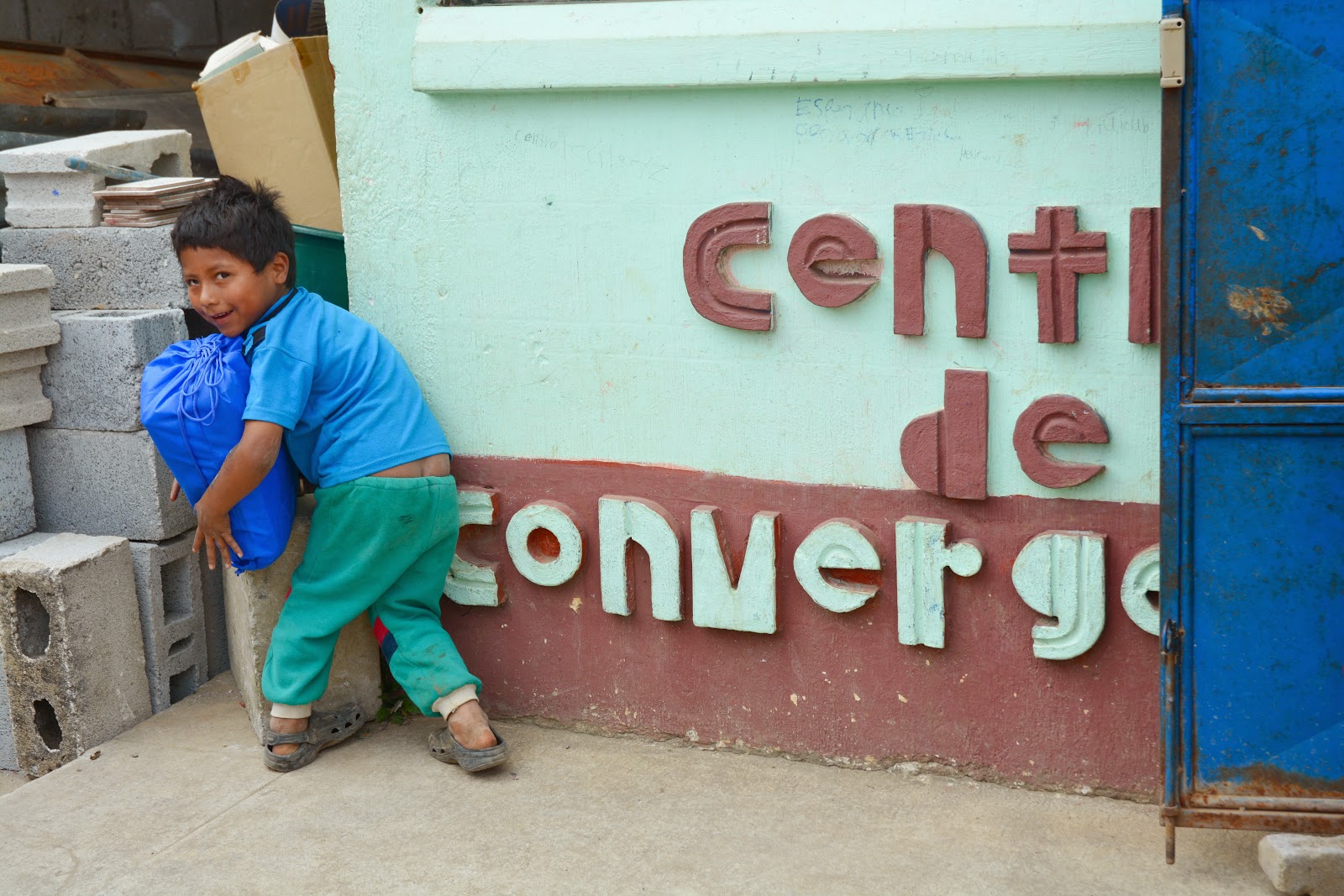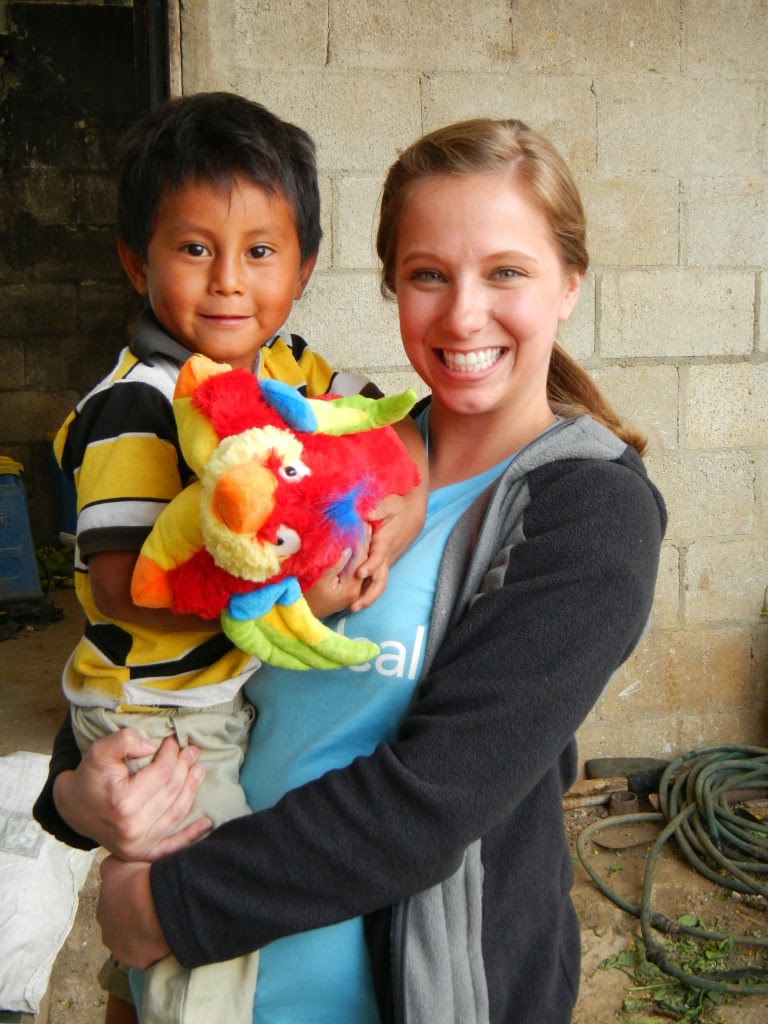The last service day of the trip proved hugely rewarding. We arrived in San Rafael el Arado, a small agricultural community that is impoverished even by Guatemalan standards. There are about 1,600 indigenous Mayan people who live there and speak Kaqchikel, one of over 20 Mayan languages in Guatemala, as their first language. Parents work as day laborers in agriculture, the poorest paid
work, so the kids work, too, to help the family survive, missing out on school. Some of the adults do not a good grasp of Spanish, the national language. This is a significant barrier for them in the wider society, in terms of ever getting ahead.
The physical environment in the town is grim and marked by extreme poverty, but the mood is brightened by the people themselves, the children bright and eager, the women and girls wearing hand woven traditional garments, embroidered with rich vivid colors and patterns drawn from nature.
 Our partners in service on this day were Common Hope and Constru Casas. With Common Hope, the other Allina team had assembled earlier in the week hundreds of school supply kits in blue bags.
Our partners in service on this day were Common Hope and Constru Casas. With Common Hope, the other Allina team had assembled earlier in the week hundreds of school supply kits in blue bags.We got the delightful task of handing them out and seeing the excitement of the kids as they start a new school year well-prepared. The first step was getting the 720 kits and assorted other school supplies off the truck and into the school.
All hands on deck!
 We did this bucket brigade style, and got giggly help from some of the kids. The kids here as elsewhere in Guatemala are friendly and playful like anywhere in the world, but the parents tend
We did this bucket brigade style, and got giggly help from some of the kids. The kids here as elsewhere in Guatemala are friendly and playful like anywhere in the world, but the parents tendto be a good bit more shy and stoic in their demeanor than adults in the US.
However, Nick brought out the smiles in the grown townspeople as well the kids with his amazing red beard (and huge blue eyes and total willingness to make goofy faces!) It was a great icebreaker, and nice to see these patient hardworking women laugh out loud!
The task of unloading done, we broke into smaller teams, one to work on the house construction project again earlier in the week with Constru Casa, and the other two work on handing out
the supplies to the students and their families.
 Because we speak Spanish, Alissa and I were assigned to receiving the families and getting the paperwork end done so they could then go on to get the supplies. We did our very best to greet each family warmly and with respect, as far away from soulless bureaucrats as we could. Alissa shared her
Because we speak Spanish, Alissa and I were assigned to receiving the families and getting the paperwork end done so they could then go on to get the supplies. We did our very best to greet each family warmly and with respect, as far away from soulless bureaucrats as we could. Alissa shared herwarm, lively personality and I tried out some Kaqchikel salutations I had learned (via ‘TV Maya’ on YouTube!) previous to the trip, laughing along with the women and kids at my goofy accent. They appreciated the effort! We noticed along the way that the majority of the mothers could not even write enough to sign their names, and used their thumbprint instead. It underscored for us the extreme need in this town for even the most basic education.
As I mentioned, with the poverty and agricultural setting, kids are routinely pulled out of school to
 help the family survive economically. So literacy is very low in the countryside. The Common Hope education project began here in 2008 and by the next year they saw a 57% increase in school attendance, demonstrating that the community was eager for this opportunity for the children. Six students graduated from elementary school in the first couple years, which was an outstanding in this community.
help the family survive economically. So literacy is very low in the countryside. The Common Hope education project began here in 2008 and by the next year they saw a 57% increase in school attendance, demonstrating that the community was eager for this opportunity for the children. Six students graduated from elementary school in the first couple years, which was an outstanding in this community.After several years of successes on the elementary level, the community is now looking to have some children graduate from high school, the first to do so in their families EVER. In high school many kids learn a trade, giving them a chance to break the cycle of poverty that is the lot of their parents as farm day laborers.
Common Hope has a model of sweat equity and active partnership with the communities they serve. Thus they partnered with the community in San Rafael to provide construction materials a couple years ago and the construction itself was done by community members to make big improvements in the school. With the understanding that health and family stability are critical to kids being able to stay in school, Common Hope partners with a local nonprofit clinic, El Faro to ensure access to
affordable health care for kids and their families, and makes sure that kids in school have at least one good meal a day. CH also supports social works visits to identify individual needs and help families pull it all together. How exciting for us from Allina to be a part of something that important in changing lives in this community! Great, just great to see the excited faces of the kids.
Child Sponsorship – Another Way to Connect
 |
Abby, Tonya with sponsored child Ingrid and her
family, San Rafael
|
A more personal, longer- term connection one can make to these communities is via sponsorship of individual children, which is a key funding source for Common Hope’s programs. This is not something that was pushed on us in any way. The work brigade contribution that we made was highly appreciated. In my skeptical way, I have to say before I went I wondered about the
value of these sponsorships and how much difference they could make.
 |
Ellie H and Edy, whom she began
sponsoring a year ago.
|
Seeing the well- thought out programs that work at not just providing food but helping children get out of the cycle of poverty, several of us did decide to sponsor children through Common Hope: Abby, Chris A., Mary, Tonya, Ellie H and me.
The goal is to help the child stay in school through high school through a variety of supportive means.
One of the sweetest parts of our day in Rafael was seeing our sponsored kids and meeting their families- amidst dire conditions, big grins and plans, working together for a better future!
Siobhán Dugan, Employee Health and Safety Specialist, APR



No comments:
Post a Comment